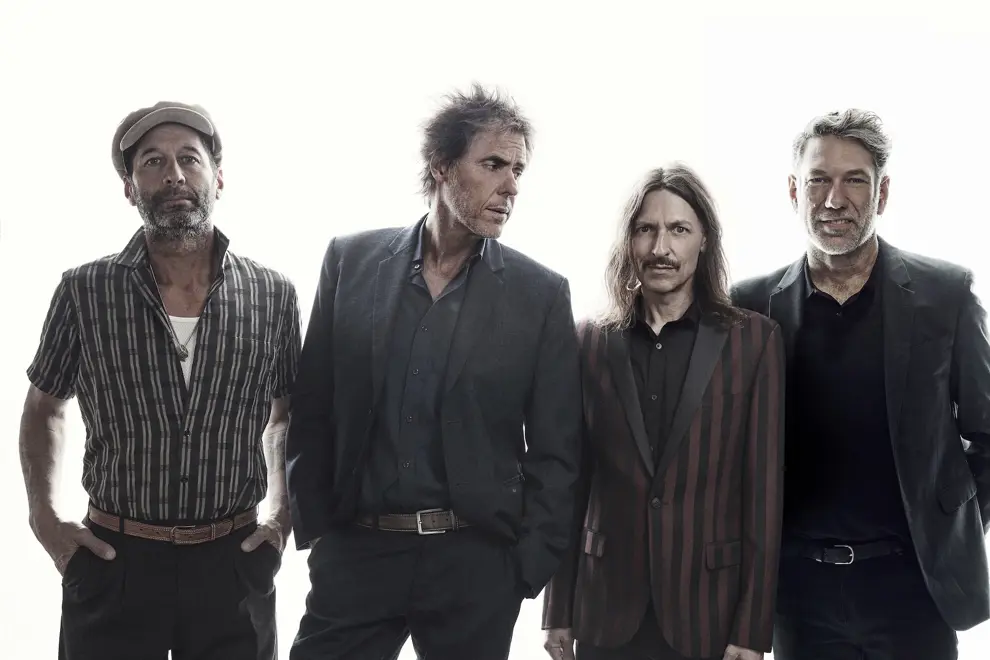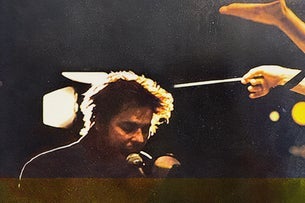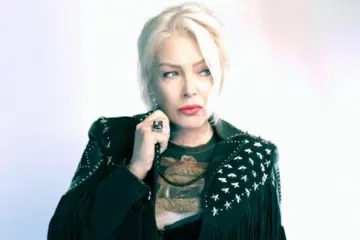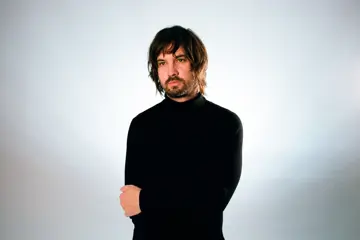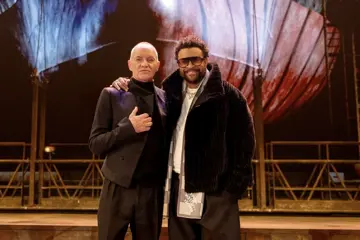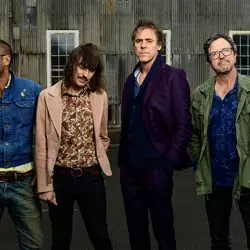 The Whitlams
The WhitlamsSeated behind the piano at Melbourne’s Hamer Hall, Tim Freedman welcomes the sold-out crowd to tonight’s “recital”, noting that it’s a little more civilised than The Whitlams’ usual gigs.
Backed by a 44-piece orchestra, the band opens the show with a song called Beauty In Me, a track from the 2006 album Little Cloud, sung from the perspective of a 19-year-old girl.
“They will see the beauty in me,” Tim sings. “It’s in my soul.”
It seems appropriate.
The two-hour show encapsulates The Whitlams’ remarkable story. Beauty, pathos, humour, tragedy and triumph.
There’s been no story in the history of Australian music quite like The Whitlams.
When founding member Stevie Plunder died in 1996, Tim Freedman thought the show was over. And then triple j picked up a throwaway song called I Make Hamburgers.
Recuperating in Thirroul, Tim heard the song coming through the tinny speakers at the local pool. “Oh okay,” he thought, “I’ve still got a career.
“It was almost like poking me in the chest saying, you know, you should probably keep going.”
I Make Hamburgers is now the band’s most-requested song live. Tim has done an orchestral arrangement, though it’s not part of tonight’s set.
“The orchestrated version starts with Summer Breeze, the song I ripped off, and then speeds up suddenly into Hamburgers.”
I Make Hamburgers became The Whitlams’ first entry in triple j’s Hottest 100, coming in at number 79.
The first half of the orchestral show with the Melbourne Symphony Orchestra is dominated by the Charlie trilogy from 1997’s Eternal Nightcap: Charlie No. 1, Buy Now Pay Later (Charlie No. 2) and Charlie No. 3, as well as Little Cloud’s Keep The Light On, which Tim refers to as Charlie Number Two-And-A-Half.
Don't miss a beat with our FREE daily newsletter
“I’ve taken this opportunity to tell the story in chronological order,” Tim explains. “People have just sat down, they’re in an impressive setting, so I think they’re open to some quiet, evocative storytelling. It’s probably the most atmospheric 45 minutes that I’ve done without breaking it up with an upbeat tune.”
The tale of an “errant friend”, the Charlie songs hit hard. “Charlie, you’re not my Charlie anymore,” Buy Now Pay Later starts. “You’re screwing it up, you’re killing your soul with an audience looking on.”
The first set also includes a surprise – a cover of Two Little Boys, a song made famous by disgraced Australian entertainer Rolf Harris.
In 2008, Tim was invited to perform a Harris song when he was inducted into the ARIA Hall of Fame (an honour that was revoked six years later when Harris was convicted of the sexual assault of four underage girls).
Tim told the Hall of Fame organisers he didn’t think any of Rolf’s catalogue suited him, though he liked the Two Little Boys lyric, which was written by Theodore Morse about the American Civil War.
Tim recorded his reworked version. “I was on Sony at the time, and they thought it had a chance of getting some action in England.”
Sony made a film clip, which has never been seen. Just as he was readying the UK release, Tim picked up a copy of the Sydney Morning Herald to discover that Harris had been charged.
“He’s been dead long enough now for me to bring the song back,” Tim believes. “I don’t think one of the most poignant songs about soldiers should be cancelled, even though I agree that Rolf should be.”
The first half of the orchestral show concludes with The Curse Stops Here, a heartbreaking reminder that Tim is the only surviving original member of the band.
Stevie Plunder died not long after the release of the band’s second album, Undeniably The Whitlams. He was found at the bottom of Wentworth Falls in the Blue Mountains.
“Stevie was amazingly jocular,” Tim reminisces. “He had his crooked grin. He was always having the most fun in the pub, and he could really light up a room.
“There was also a dark side to him – he drank too much, he wore himself out. Like a lot of people, he burnt too brightly, and he burnt out. It was a great tragedy because he was like the court jester of Newtown.”
Though he regrets the ponytail, Tim likes looking back at an interview the original band did at the Annandale in 1993. “Andy [Lewis, double bass player] never spoke on stage – he couldn’t get a word in edgeways with Stevie and I – but it’s great to see him speaking in that footage.”
Andy died of suicide in 2000.
Most listeners thought Blow Up The Pokies – the band’s first Top 40 single – was about the impact of poker machines on the live scene. But it was a much more personal song.
“Andy had left the band, and I wrote a nasty song about his gambling problem,” Tim reveals.
He died a few months later.
“I always feel very sad when I sing that song.”
“I think I’m pretty resilient,” Tim adds. “I didn’t quite have the crosses to bear that Stevie and Andy did. I never quite got beaten by the habits.
“But losing two early members like that ensured that if I was going to do it, I really wanted to do it. I was willing to make the sacrifices that showbiz usually exacts from the foolish young people who put their hand up and say, ‘Please choose me.’”
Explaining The Curse Stops Here, Tim says: “There was no way I was going to let this be seen as a truly tragic story.”
Remembering the band’s early days in Sydney at the start of the ’90s, Tim notes, “You had to be a young man to cope with all of that.
“We were just a very silly band. For two years, we’d do three drunken sets in front of other drunks.”
An early live favourite was called Jesus Has Got An Erection. Tim took a Gershwin tune, I Got Plenty O’ Nuttin’, and wrote some “silly lyrics”.
“There were some occasional walkouts,” the singer recalls, conceding it was “a bit insensitive to those with Christian beliefs”.
“My fondest memory is that I got to work with two completely natural musicians,” Tim continues. “Stevie and Andy had great ears – better ears than me. They were human jukeboxes, so things would happen really quickly. I’d play them something and it’d be a great-sounding song in like 10 minutes. That’s my main happy memory of those times.”
Tim acknowledges The Whitlams were a strange fit in the indie world, with their sweet, melodic sound. But watching their orchestral show, I scribble a sentence in my notebook:
Piano pop can be punk rock.
It’s a stretch, but when that proposition is put to Tim, he pauses before saying: “I don’t like to waste three minutes and not say something.”
A highlight of the second set is Out The Back, a song from 2002’s Torch The Moon, which features a stunning six-minute string interlude composed by Peter Sculthorpe.
“I really got taken away with that,” Tim remarks to the Hamer Hall audience when the song finishes. “I really miss Peter, and I was remembering just then the day I went over to his house.
“He called me and told me he’d finished Out The Back. I thought he’d just put some strings on top of my song, but he said, ‘Oh no, I’ve gone to town here.’”
Tim – who met the composer when they sat next to each other at the APRA Awards – went to his home the following day. “He played it for me on this terrible old piano with his gnarly arthritic fingers. He was so proud of it. He said, ‘This is the most I’ve ever sounded like Duke Ellington.’
“And we celebrated for two-and-a-half days. I’ll tell the story of those two and a half days if I ever put out a memoir.”
Asked about the story, Tim elaborates: “I was 38 and he was 75, and he completely outlasted me – and I was pretty match fit.”
The second half of the orchestral show also features a stirring tribute to the man who inspired the band’s name, Gough Whitlam, who was Prime Minister from 1972 to 1975.
Featured on their debut album, 1993’s Introducing The Whitlams, Gough made it clear that the band’s name wasn’t a cheap stunt; they had genuine affection for the Labor legend.
“November 11 was Armistice Day,” Tim noted in the lyric. “A bushranger was slaughtered” – referencing the hanging of Ned Kelly – “and Gough was betrayed.
“Days of wine and roses … all the artists flew in and all the arseholes flew out in ’72. For you, Gough.”
Tim and Gough bonded at the ARIA Awards in 1998 when the former PM presented The Whitlams with the Best Group award, which Tim says was “the greatest moment of my professional life”.
When Gough opened the envelope to reveal that The Whitlams had beaten You Am I, Savage Garden, Regurgitator and The Superjesus, he declared: “It’s my family.”
The band knelt at Gough’s feet. And Tim made one of the most memorable speeches in ARIA history, sending up a ridiculous Pauline Hanson speech and referencing Bob Hawke’s penis.
“I really didn’t think he was there to give us that prize,” Tim recalls. “They kept the secret from me so well. I was in a strange state of denial, so my excitement was real.”
The awards capped a remarkable rise for the band. They had not been invited to the previous ARIAs; instead, they were doing their own gig at the Metro, sending up the ceremony.
“We started the Metro show with a voiceover saying, ‘And the winner of the ARIA for Most Potty Mouth is …’, and I came out and did an acceptance speech that was as blue as I could manage.
“And 12 months later, we were there at the real thing.”
Four years after the ARIAs, when Tim was having dinner at an Italian restaurant in Sydney to celebrate the release of the Torch The Moon album, he stumbled into a private room to find Gough celebrating his 60th wedding anniversary. The former PM stood up and said, “Ah, my other son.”
Gough’s real son, Nick Whitlam, wasn’t always a fan. In his autobiography, Still Standing – A Memoir, Nick wrote: “I wasn’t happy when Tim Freedman hijacked the family name and named his band The Whitlams. In retaliation, I once said, at least the Dead Kennedys could sing.
“Freedman can sing – I was unfair – and it took him years to forgive me.”
Nick also recalls a meeting with a shop assistant. “Any relation?” she asked. “Why, yes, I’m his second son.”
“No, that can’t be,” the confused shop assistant said. “We’re talking about The Whitlams, the band.”
Before playing Gough at the orchestral show, Tim makes a point of mentioning that he’s honouring both Gough and his wife, Margaret.
“I got to know Margaret better than Gough in the end. I shared a few meals with them, and I realised she was an equal partner in the marriage.
“When Gough was in a wheelchair and couldn’t go to concerts, I would pick Margaret up and take her to classical concerts and have a glass of champagne.
“She was just so classy but down to earth,” he adds. “And she was his equal. Never underestimate how much Margaret had to do with Gough’s life.”
The 1998 ARIA Awards coincided with The Whitlams joining forces with Warner Music.
And then came what Tim calls “the worst business decision I’ve ever made”.
With the world waiting for the follow-up to a hit album, The Whitlams delivered… Chunky Chunky Air Guitar.
Like No Aphrodisiac, the song was a collaboration with Machine Gun Fellatio’s Pinky Beecroft and Chit Chat Von Loopin Stab. In the original song, they were singing, “Chonky, Chonky, rip it up now.” Tim misheard the lyric and turned it into a song about playing air guitar.
Mark Pope, the A&R man at Warners, shook his head and told the artist: “You know, you’re allowed to stay one step ahead of your audience but not two.”
“It nearly destroyed the band,” Tim reflects. “If I had my time again, I wouldn’t release it as the first single off the follow-up album. People were just looking for a reason to drag us back down to earth and I gave it to them on a platter.”
But more than 25 years later, Tim sees the song as a “peculiarity instead of a fatal error.
“I still think those verses are tremendous; it was my mistake to put the ‘air guitar’ bit in the song. I was just looking for a chorus.”
At the Hamer Hall show, The Whitlams – Tim, guitarist Jak Housden, drummer Terapai Richmond and bass player Matt Fell – follow Gough with the live favourite You Sound Like Louis Burdett.
Many fans didn’t get to see the real Louis Burdett until the band released their retrospective DVD, The Whitlams Years, in 2004. Louis delivered a classic quote: “I don’t want to become famous because then I’d start getting sex and then life would lose its simplicity.”
“To meet the real Louis Burdett on the DVD was important for a lot of people because they were asking me, ‘Is that a French philosopher or a figment of your imagination?’”
But Louis was a key character in The Whitlams’ early years. He played drums on The Ballad Of Lester Walker, the first song on the band’s debut album. He was Tim’s housemate for a couple of years, and a member of the band for about six weeks.
“He was an astounding musician,” Tim says. “He was like a Keith Moon of avant-garde jazz. If you saw Louis drum, you never forgot it.”
While sharing a house with Louis, Tim asked the drummer: “Do you mind if I put your name in this song? It’s about how you whinge a lot.”
“Yeah, whatever,” Louis replied.
“None of us thought the song would become well known. Even though Louis was a performer, he found he was more famous for that song than his own career.
“Over the years he became quite bitter that I’d stolen his name, and we haven’t had much to do with each other over the past 20 years, sadly.”
After Eternal Nightcap sold 200,000 copies, I wondered why The Whitlams decided to team up with a major label. Tim replied with two words: “To globalise.”
The band received releases in Canada, France and New Zealand, but America remained out of reach.
“After a while, I realised I could satisfy my ambitions in Australia,” Tim says. “And I think I came to the conclusion we were a bit too parochial for overseas markets.”
Despite their fervent following, the band continues to polarise pop fans. Why do some people dismiss The Whitlams? Perhaps it’s the politics of envy: how dare an indie act cross over to the mainstream.
Twenty-one years ago, Tim told me: “I’m very aware that some people love The Whitlams and some people hate us.
“But I’m glad we always get opinions because it means that people aren’t ignoring us. And we always sell out our tours, and our last three records have gone platinum.
“So, if all I have to cope with is some people having different tastes to me, that’s fine.”
Jane Gazzo, the co-founder of the wildly successful Sound As Ever Facebook page celebrating Australian indie music of the ’90s, says two acts polarise their members:
The Whitlams and Ben Lee.
Does Tim Freedman ever ponder why? “I think about it even less than I did 21 years ago,” he smiles.
“We’ve managed to become even more successful. Our live numbers are as good as they were in 1999 – and you can’t say that about every ’90s band.
“The ultimate revenge is continued success. It gives me a reason to not have to think about it.”
For every hater, there’s a passionate fan. Even if they have no new release, The Whitlams can do multiple nights at major venues across the country.
The second half of the orchestral show includes two songs that were inspired by “falling in love with a girl from Northcote in 1993”.
Tim’s Melbourne girlfriend, Martine Murray, an artist, dancer and acrobat who later became a successful author and illustrator, also inspired the band’s breakthrough smash No Aphrodisiac, the first independently released Aussie single to top triple j’s Hottest 100.
“We were growing apart,” Tim recalls, “not writing to each other so much.
“The first half of the song came out in one go on Chris Abrahams’ piano at the end of a long night at his house when he’d gone to bed. It was a little fey, so I decided to write more and let the protagonist find all sorts of increasingly absurd stimulations to tide him over as he waits for a reunion.
“Pinky and Chit Chat – who would later become Machine Gun Fellatio – had just played me a demo of theirs, which consisted of very funny personal classifieds, and we used six lines of that to finish the song.”
Forty, shaved, sexy wants to do it all day/ With a gun-totin’ trigger-happy tranny named Kinky Renée/ Tired teacher, 28, seeks regular meetings for masculine muscular nappy-clad brutal breeding/ While his wife rough-wrestles with a puppy all aquiver on a wine-soaked strobe-lit Asiatic hall of mirrors and a dash of loneliness.
John Farnham – who covered No Aphrodisiac in 2005 – observed, “The lyrics to this song are right out the window!”
“It’s quite wonderful to hear someone who can sing that well singing those strange lyrics at the end,” Tim smiles. “Let’s face it, he’s just an undeniably great singer.”
Some orchestral collaborations, like KISS with the MSO, are a little incongruous. But The Whitlams were made to be backed by an orchestra.
Australian composer Richard Tognetti suggested the idea, and the orchestra shows launched in 2004.
“It’s always uplifting,” Tim says of the experience. “I make sure that I dial a lot of the orchestra into my ears so that I don’t take for granted what’s happening.
“It stirs me as much as it stirs the audience.”
The band’s songs have been orchestrated by an array of Australian composers, including Peter Sculthorpe, Benjamin Northey, Brett Dean, Iain Grandage, Daniel Denholm, Sean O’Boyle and Jamie Messenger.
“I particularly love that all the composers were given carte blanche. So they’ve actually added a lot of melodies that weren’t in the original records. I feel as if there’s twice as many hooks happening in some songs as there were when I released them.”
But playing with an orchestra presents some unique challenges for a rock band.
“A band is successful at orchestral collaborations when they know how to play with the same energy but at 70% of the volume,” Tim explains.
“An orchestra will always be happier the quieter a band is, so we really have to keep the smile within, in terms of our energy levels. But one gets used to the beautiful languid way that they feel time.
“Strings will always happen a little bit after the beat, so I have to be far more conscious than usual to be lazy in my timing. If I start getting excited, like a man of under 50, then I can get ahead of the orchestra and that’s when disasters happen.”
Will this forthcoming tour lead to a live album?
“I’m still weighing that up, to be honest. I like the fact that the only place people can hear these ‘four-dimensional’ versions is live; that makes some sense to me.
“What’s to be gained from releasing it? Are people more inclined to go see a show if they’ve already heard it? Or less inclined? I guess, both are true. Some people will say, ‘I don’t need to see that, I can listen to it on Spotify.’
“What do you say to the people who come to live shows who actually pay the bills? And what do you give away for free to become part of the white noise?
“It’s a question I’m often thinking about.”
Like the orchestral show, Tim Freedman sees his life in two acts. In 2004, on the verge of his 40th birthday, he remarked: “If life is in two halves, then I’ve done the wine, women and song in one half, and I’m going to be home a lot more in the next 20 years.”
But he also predicted, “I’ll be having fun into my 60s.”
Now 60, the man who once sang, “Newtown, I love you, but you try and kill me”, admits: “I’ve become a bit of a bed-and-book man by 11pm.
“I enjoy culture as much as I did – I still like to go to a couple of concerts a week – though I’m frequenting a lot less bars than I used to.”
He reflects on that first flush of success as he introduces Thank You (For Loving Me At My Worst), which he says is “an apology for my loose behaviour”.
He laughs when he notes the song is now played at funerals.
“Can we be crazy for a few more years?” Tim sings. “Have I got them in me?”
You better believe it.

